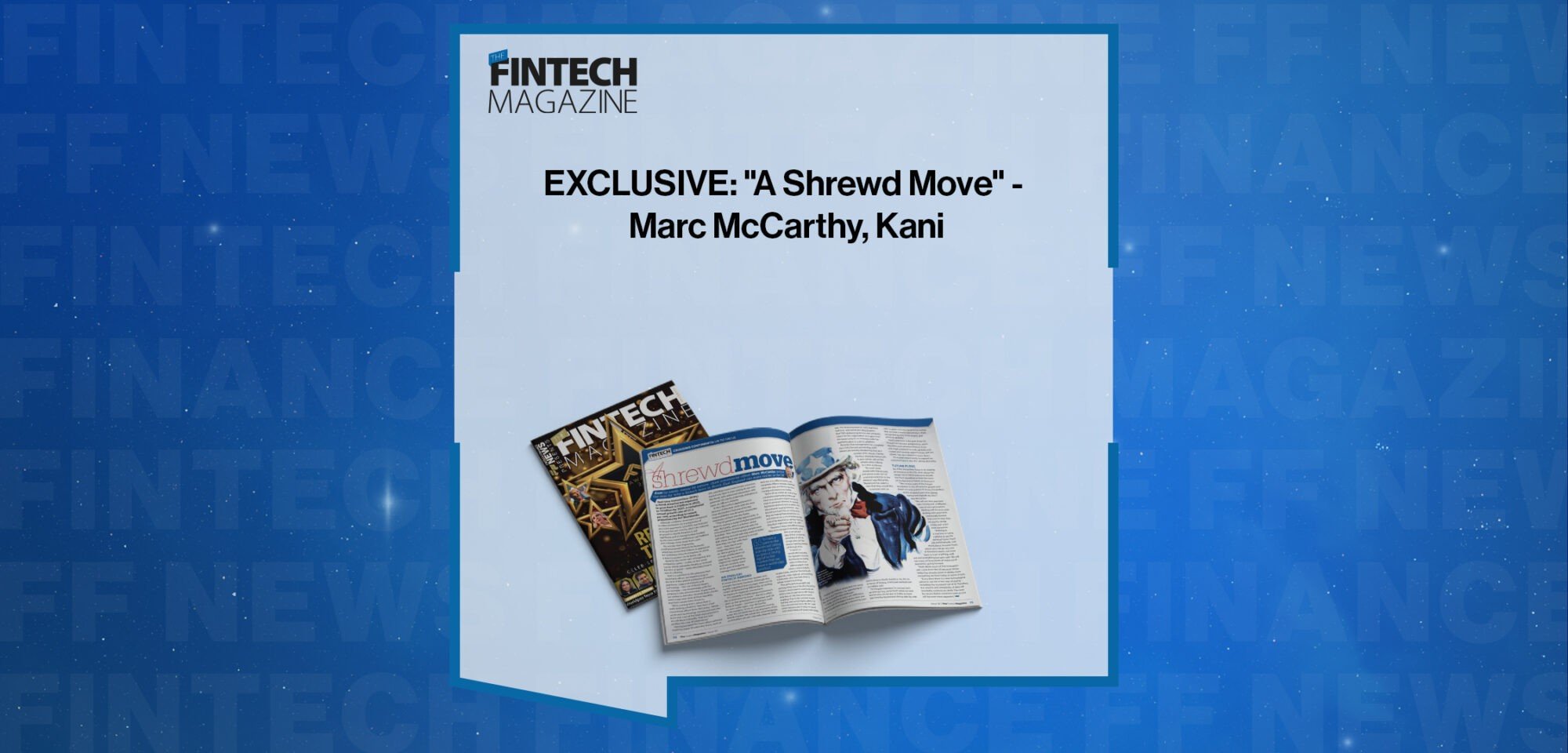Breaking News

EXCLUSIVE: “A Shrewd Move” – Marc McCarthy, Kani in ‘The Fintech Magazine’
Kani by name, canny by nature, chief commercial officer move Marc McCarthy makes the case for why a fintech born in North East England can make strides in the US
Real-time transactions (RTPs) in North America are expected to grow from 3.9 billion in 2022, to 13 billion by 2027, a compound annual growth rate of 27.3 per cent, according to recent projections by ACI Worldwide.
Although a relative slowcoach compared to other territories, (as a proportion of electronic payments, USA RTPs are forecast to be just five per cent by 2027) the volume of growth in North America is still significant and it’s being further fuelled by the new instant settlement rail FedNow and a steady move away from cash.
No wonder Kani Payments, a self-proclaimed ‘fintech for fintechs’, which has reconciled billions in payments for customers since its inception in 2018, is keen to answer Uncle Sam’s call. Based in the north-east of England, the company’s name – a play on the word ‘canny’ which translates locally as ‘shrewd’ but also as ‘good’ – aptly describes how it sees its offering.
Kani is a solution to the pressure that bank back offices are experiencing in the face of the global explosion of instant payments. Legacy processes and technology – the use of Excel sheets, for example – are increasingly unfit for purpose in this environment. If payments are settled in minutes, seconds even, banks need a real-time view of their liquidity, and that’s where Kani comes in.
“We’re coming into a space that is really lacking solutions,” says Kani chief commercial officer Marc McCarthy. “While we’ve seen technology introduced into the front end, a lot of the back-end processes are still done manually. That is a real problem for a lot of institutions.”
Having provided the back-office software engine to many UK payment firms, such as TPL and Moorwand and climate-conscious bank Frost, Kani is now casting its eye over the Pond, with advanced discussions with potential US clients underway, and plans to open an office in Atlanta.
In fact, McCarthy’s appointment in January of this year came with the very clear declaration that one of his key responsibilities would centre around the expansion of Kani into the States.
“The US presents a big opportunity, in that it’s seeing a surge of digital payments,” says McCarthy, who is a former senior vice president of international sales for AutoRek. “Not that long ago, people were still walking around with big wads of dollar bills. Now, they are starting to accept that they can tap with their card – they don’t even swipe like they used to. We’re going to see a huge proliferation of payments, including digital micropayments, and we certainly want to be part of helping manage that expansion.”
AN ENGLISH FINTECH ABROAD
A move into the American market, isn’t straight-forward, however. Although less tightly regulated than Europe, there are 50 states all transacting differently, according to legacy or regional conventions. It’s certainly a challenging environment for a newcomer to enter – the US is often seen as the graveyard of European and UK fintech hopes – but Kani is going in with its eyes wide open, says McCarthy.
He explains: “A lot of companies tend to enter the US thinking it’s an extension of the British market. We speak the same language, so therefore we are culturally aligned. Well,we’re not. It is a different country, with completely different attitudes, and I think we’ve seen that, over the past few years, coming more and more to the fore.
“But in all our markets we need to have a business understanding of data, and more so as we look to expand into the US. Look at consumer behaviour, for example. Businesses obviously want to predict what the consumer is going to do next – what kind of purchases they are making, when they are making those transactions, etc – and what we see is a lot of companies have a lot of the data that can tell them that, but they don’t really know what to do with it.
“Because it comes from different sources, they try to manage it individually, rather than as one group of data. At Kani, we basically consolidate all of it into a single place, and then provide reporting elements off the back of that.
“In the US, it is complicated, not just by the regulation, but by the fact that you are dealing with a number of very different players: credit unions, community banks, smaller banks, and then the mid-tier, the regionals, super-regionals, and everything in between, who have been slower to adopt modern technology.
“The particularly encouraging and exciting thing here is that often they’re keen to learn, they’re keen to understand, and they’re keen to get best-in-class. But not only that, it’s like they almost want to leapfrog. They’re like, ‘we know we were behind, and we had legacy systems, but now we want the future. We don’t want what everyone else is using, we want to look at the latest and greatest technology.’
“I think that really is where Kani can excel. So, for us as a business, the opportunity in the US outweighs the challenges.”
It helps, of course, when you walk into a country full of strangers that you have one of the best known brands in finance by your side. The announcement in 2022 that Kani had been selected to join Mastercard’s Start Path global programme was certainly a boon for the organisation as it gave Kani the opportunity to co-innovate with the payments giant to scale its platform.
Recently, that arrangement has morphed into a fully-formed partnership, with Mastercard directly introducing Kani to a number of its clients. Clearly, having a stateside behemoth in your corner will oil the wheels when talking to a new audience.
“To work more closely with Mastercard, just seems to be sort of a natural evolution in the process,” says McCarthy. “Mastercard has taken a view that they would like to partner with us, particularly in North America. So, for us, in terms of timing, that’s just worked out incredibly well.
“It’s hugely important to not just turn up and say, ‘hey, we’re Kani!’ when no-one knows who we are, but actually, to have partners like Mastercard sitting side-by-side with us gives a strong signal to the market that we have a world-class product, that’s recognised by one of the largest card schemes globally.”
Kani’s selection to be part of the FIS Fintech Accelerator programme, which identifies and advances fintech firms with high potential to scale globally and creates partnership opportunities with FIS clients, has also helped to open doors.
“It’s a great opportunity to expand our customer base in the US,“ admits McCarthy.
FUTURE PLANS
So, if the immediate focus is on making an entrance in the US, what about the longer term? What payments trends has Kani identified to form the basis of the business’s future endeavours?
“The current state of the fintech ecosystem is one of extreme growth and there’s an anticipation of about $14.9trillion worth of global payments being transacted digitally by 2027,” says McCarthy. “We will see new payment rails coming out, a different way of new generations dealing with finances and dealing with payments. I personally foresee that a lot of ways that we pay for things today, just won’t exist tomorrow.
“Walking to a machine or using a phone to pay for parking? Gone. You’ll pay automatically. Just think about Amazon Fresh, where you can go into one of Amazon’s stores, not even have to scan anything, walk out and everything just gets paid. We will see more of those kinds of instances of payments, going forward.
“And I think much of that innovation will come from the US because Silicon Valley has already given us pretty much everything we have today, in terms of tech.
“Every time there is a new technological advance, we see a new way of paying – including the increased use of AI. Therefore, the volume and complexity of data will inevitably continue to climb. The need for reconciliation solutions such as ours will be even more apparent.”
This article was published in The Fintech Magazine Issue 30, Page 74-75
People In This Post
Companies In This Post
- Hidden Costs of Legacy Tech: UK Banks Shelling Out £3.3bn Annually on Managing Core Systems Read more
- Extend Secures $20 Million in New Capital and Hires Seasoned CFO Read more
- Bivial AG launches Instant 24/7 Swiss Franc (CHF) Payments Read more
- New Economist Impact Report Finds AI is Reshaping Insurance – Gradually Read more
- VoPay Expands Embedded Payments Offering with Real-Time PayPal and Venmo Payouts Read more



















